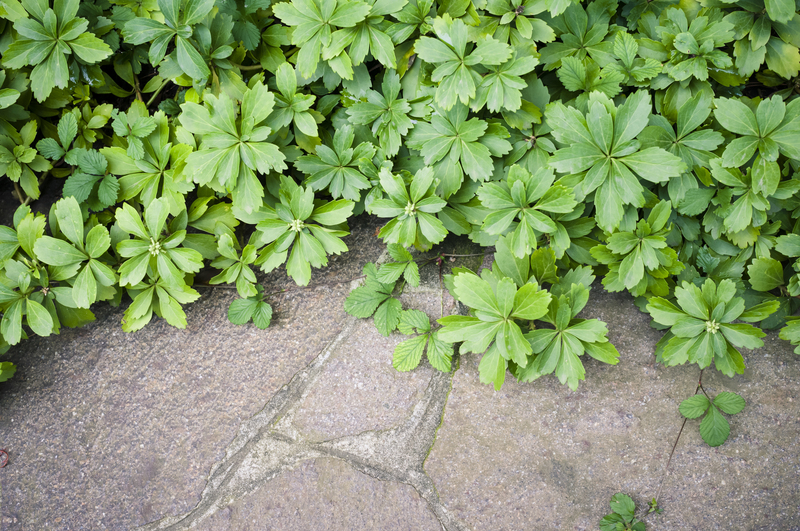Winter Plant Care: Keeping Your Garden Thriving
Posted on 08/09/2025
Winter Plant Care: Keeping Your Garden Thriving
As temperatures drop and days shorten, many garden enthusiasts face the annual challenge of preserving their beloved plants through the frosty winter months. With the right strategies, your winter garden can remain healthy, robust, and well-prepared for the vibrant months ahead. In this comprehensive guide, you'll discover top winter plant care techniques, essential tips for protecting various plant types, and expert advice on ensuring your garden remains an oasis all year round.
Understanding Winter Plant Care
Winter brings a unique set of challenges for gardeners. Cold temperatures, frost, snow, and reduced sunlight can stress plants, making them vulnerable to damage or even death. Successful winter gardening requires a thoughtful approach tailored to your climate and plant varieties.
Why is Winter Care Crucial?
- Protects Plant Health: Proper winter care reduces risks of frostbite, dehydration, and disease.
- Boosts Spring Growth: Well-cared-for plants rebound faster and stronger when warmer weather returns.
- Saves Time and Money: Preventing damage means less replanting and lower maintenance costs.
Effective winter plant care is about more than survival--it's about thriving.

Essential Steps for Caring for Outdoor Plants in Winter
1. Assess Your Garden
Start by reviewing your garden inventory. Identify which plants are hardy perennials, which are tender, and which require extra protection. Take note of:
- Plant Hardiness Zones: Reference the USDA Hardiness Zone Map to determine which plants can withstand your local winters.
- Microclimates: Pay attention to sheltered spots that may be warmer, or exposed areas more prone to cold winds.
- Plant Type: Deciduous versus evergreen, annual versus perennial, and container-grown versus in-ground plants all have different winter needs.
2. Mulching: Your Garden's Winter Blanket
Mulch acts as insulation, moderating soil temperature and reducing the risk of freeze-thaw cycles that can damage roots. For winter gardening success, apply mulch in late autumn, after the first hard frost.
- Use Organic Mulch: Straw, shredded leaves, wood chips, or bark are ideal.
- Depth Matters: Spread mulch 2-4 inches thick around the base of plants--being careful not to pile it directly against stems or trunks.
- Mulching Containers: Potted plants also benefit from a layer of mulch atop the soil in the pot.
TIP: Remove excess mulch in early spring to prevent rot and allow new growth.
3. Watering Wisely in Winter
While plants require less water during dormancy, adequate hydration is essential--especially if soil is exposed or there is little snow cover. Drought-stressed plants are more susceptible to cold damage.
- Water Before Freezes: Deeply water your garden just before the ground freezes so roots have moisture reserves.
- Monitor Dry Spells: During dry, sunny winters, water on warmer days when the soil is not frozen.
- Avoid Overwatering: Soggy soil leads to root rot, a particular risk for container-grown plants.
4. Shielding Plants from Harsh Weather
Wind, ice, and heavy snow can break branches and dehydrate leaves. Take proactive winter plant protection measures:
- Burlap Wraps: Wrap burlap around evergreens and young trees to protect against windburn and desiccation.
- Frost Cloths: Use specialized plant covers or frost blankets on particularly sensitive species during cold snaps.
- Tent Structures: For small plants, set up temporary plastic tents, ensuring adequate ventilation to prevent mildew.
- Avoid Salts: Keep de-icing salts away from garden beds as they can damage roots and soil health.
Specific Plant Types: Tailored Winter Garden Care
Winterizing Perennial Beds
Perennial plants--such as peonies, hostas, and daylilies--often die back above ground but store energy in their roots for spring.
- Cut back dead or diseased foliage in late fall to prevent pests and diseases from overwintering.
- Mulch heavily over the crown to insulate dormant root systems.
- Leave ornamental grasses and seed heads up for winter interest--they also provide shelter for wildlife.
Safeguarding Shrubs and Trees
Woody plants have unique requirements for successful winter survival:
- Prune Strategically: Prune damaged or crossing branches, but avoid major pruning until late winter or early spring.
- Protect Trunks: Wrap young or thin-barked trees to prevent sunscald and animal damage.
- Brush Off Heavy Snow: Gently remove snow to prevent branches from breaking--avoid shaking icicles, which can cause wounds.
Successful Overwintering of Container Plants
Plants in pots are more vulnerable to freeze damage due to exposed roots. Key strategies include:
- Group containers together in a sheltered spot close to the house or garage.
- Insulate pots by wrapping them in bubble wrap, burlap, or old blankets.
- Raise containers off the ground with pot feet or bricks to improve drainage.
- Where possible, move tender plants indoors or into a cold frame or unheated greenhouse.
Helping Evergreens Stay Green
Evergreen trees and shrubs lose water through their leaves or needles even in winter. To prevent winter burn:
- Water deeply before the ground freezes.
- Spray with anti-desiccant products if your climate is particularly harsh.
- Shield with burlap barriers if your yard is exposed to strong winter winds.
Protecting Bulbs and Root Vegetables
If you grow spring-flowering bulbs or keep root crops in the ground over winter, proper care is vital:
- Bulbs: After planting, apply a thick mulch layer for insulation, and avoid disturbing until spring.
- Root Veggies: Mulch carrots, parsnips, and beets heavily to harvest fresh, crisp roots throughout the winter.
Indoor Plant Care: Keeping Houseplants Healthy in Winter
Managing Light and Temperature
Winter's lower light and cooler indoor temperatures can disrupt your houseplants' growth. To help them thrive:
- Move plants closer to south- or west-facing windows for maximum light.
- Supplement with grow lights if necessary.
- Avoid cold drafts and keep plants away from direct heat sources that could scorch leaves.
Adjusting Water and Humidity Levels
Indoor air often becomes dry due to central heating systems.
- Reduce watering frequency as most houseplants grow more slowly during winter.
- Mist leaves, use pebble trays, or run a humidifier to raise humidity.
- Watch for signs of overwatering, such as yellowing leaves or root rot.
Feeding and Pest Control
Most houseplants need little to no fertilizer during the winter rest period. Maintain vigilance for common pests like spider mites and fungus gnats, which may become more prevalent indoors.
Winter Garden Maintenance Tips
Winter Tool Care
While your plants rest, take time to clean, sharpen, and oil your garden tools. Properly storing equipment prolongs its lifespan and improves garden productivity in the coming season.
Planning for Spring
Winter is the perfect time to plan garden improvements, select new plants for spring, and review what worked well in the past year. Start a garden journal and dream up next year's thriving landscape!
Common Winter Plant Care Mistakes to Avoid
- Ignoring Microclimates: Failing to recognize protected vs. exposed areas can lead to plant losses.
- Improper Mulching: Applying mulch too early can attract rodents, while too much can smother plants.
- Overwatering Containers: Waterlogged roots easily freeze and rot in cold temperatures.
- Neglecting Indoor Plants: Forgetting to adjust for indoor climate changes can result in drooping, pest-ridden houseplants.
Avoiding these pitfalls will greatly boost your winter gardening success.
Frequently Asked Questions about Winter Plant Care
How do I know if my outdoor plants need extra winter protection?
Plants new to your garden, those that aren't rated hardy in your zone, and shallow-rooted varieties (like herbs or succulents) generally need extra attention during cold snaps. Always check the expected minimum temperature for their type and your local forecast.
Is it too late to mulch once it's already snowed?
It's never too late for mulching! Add a layer as soon as snow melts or is cleared. Even a winter mulch applied later helps moderate soil temperature and moisture levels.
Can I use plastic to cover my plants in winter?
While plastic can provide temporary protection during extreme cold, it traps moisture, increasing the risk of rot. For longer-term coverage, use breathable materials like burlap or frost cloth instead.
Is it necessary to fertilize plants in winter?
Generally, winter is not the time to fertilize most outdoor and indoor plants, as they're dormant or growing very slowly. Resume feeding in early spring as new growth begins.

Key Takeaways for Effective Winter Gardening
- Plan ahead: Understand your plant types and climate zone for personalized care.
- Mulch generously but correctly, for root insulation.
- Monitor watering: Avoid both drought and overwatering.
- Shield plants from winter winds, snow, and wildlife when needed.
- Don't forget indoor plants: Adjust light, water, and humidity for best health.
Ultimately, winter plant care is a blend of preparation, observation, and timely action. With these strategies, you'll not only safeguard your garden--you'll ensure it thrives in spite of the seasonal challenges. As winter fades and spring arrives, your well-tended plants will reward you with robust growth and beautiful blooms.
Learn More and Stay Inspired
For more gardening inspiration and expert tips, explore seasonal guides and join your local gardening community. A little extra effort during the winter doldrums pays off all year--and nothing beats the reward of a garden that triumphs through every season!



